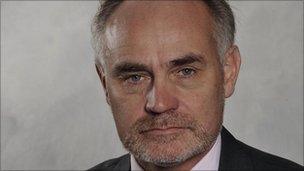No 'prison parties' says No 10 after Blunt comments
- Published

Mr Blunt said Winston Churchill approved of cultural events for prisoners like lectures and concerts
Justice Minister Crispin Blunt has been over-ruled by No 10 after he suggested prisoners could be allowed to hold parties.
Justice Minister Crispin Blunt said a ban on "inappropriate" prison events, introduced in 2008 after reports of fancy dress parties, was "daft".
He blamed the media for an "absurd over-reaction" over the issue.
But No 10 insisted there would be "no such parties" after Mr Blunt's comments were reported in a newspaper.
David Cameron's spokesman said the prime minister retained full confidence in the minister.
Mr Blunt made the remarks in a speech on the "direction and reform" of the criminal justice system, external, his first major address on the issue since taking office.
'Acceptability test'
He referred to guidelines given to all prison governors last year after reports that some prisoners, including convicted killers, had taken part in a horror-themed fancy dress party for female inmates. The guidelines also covered events such as comedy nights.
They stated that all activities for prisoners, whether educational or recreational in nature, must be "appropriate, purposeful" and meet the "public acceptability test".
In approving activities, governors must consider how they "might be perceived by the public and by victims", Prison Service officials said.
Particular consideration, they spelled out, should be given to whether activities provided value for money, could be useful in tackling re-offending and how they would be perceived "if open to media scrutiny".
Mr Blunt said he had not been aware of the guidelines until taking office although he had been "vaguely conscious of some row in the tabloids about offenders being recorded as enjoying themselves".
Front page
He described the guidelines as "typical of the last administration's flakiness under pressure" and said they would be revoked.
"At the slightest whiff of criticism of from the popular press, policy tended to get changes and the consequence of an absurd over-reaction to offenders being exposed to comedy in prison was this deleterious, damaging and daft instruction."
Quoting Justice Secretary Ken Clarke, he said the coalition government would represent a "change from an era of policy making with a chequebook in one hand and a copy of the Daily Mail in the other".
Mr Blunt said arts activities in general could play a "valuable role" in helping to improve prisoners' communication skills, tackle low self-esteem and help them to come to terms with their past behaviour.
His comments were reported on the front page of the Daily Mail, beneath the headline Now You Pay For Prison Parties. The newspaper said Mr Blunt's "astonishing declaration" had "provoked fury".
A No 10 spokeswoman said Downing Street officials had "instructed" their counterparts at the Ministry of Justice to make it "very clear" there would be no prison parties.
"I understand the Ministry of Justice guidance to prison governors doesn't quite give carte blanche to such parties, but we just want to make it clear to the public there will be no such parties," she told reporters.
She refused to be drawn on whether No 10's instruction had been issued after the Daily Mail front page emerged on Thursday evening.
Pressed on whether No 10 knew about the speech or its contents before it was delivered, she stressed that policy was always discussed in the round before announcements were made.
Asked whether David Cameron retained confidence in Mr Blunt, the spokeswoman replied "yes, he does".
BBC political correspondent Ross Hawkins said Mr Blunt's policy announcement had effectively been overturned in less than 24 hours.
Ken Clarke has already attracted criticism from sections of the media and elements of his own party for suggesting the prison population is too high and there is no direct link between rising prison numbers and falling crime.
- Published11 June 2011
- Published16 July 2010